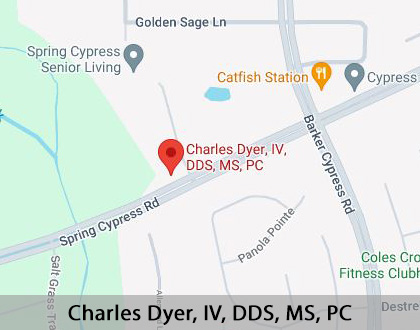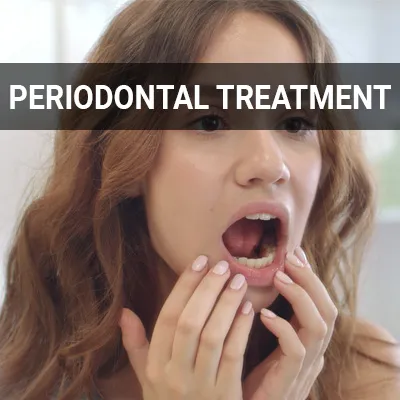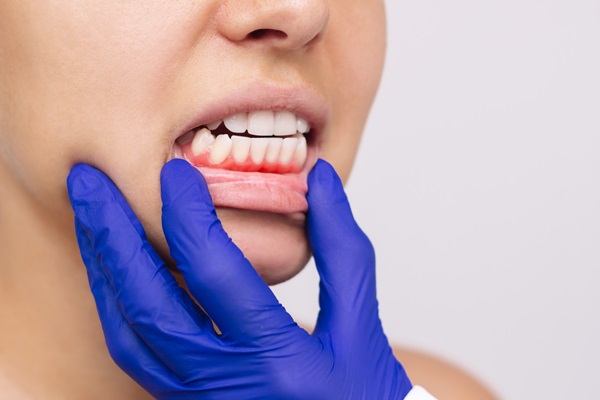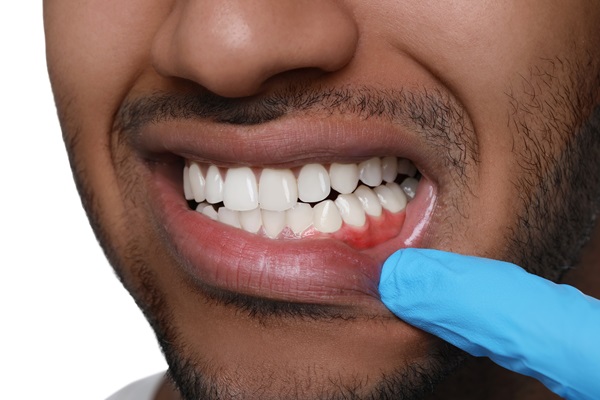Scaling and Root Planing Cypress, TX
Scaling and root planing, also called a deep cleaning, involves special tools that remove plaque beneath the teeth's roots. The scaling and root planing process can be vital in keeping your gums, teeth, and other oral structures healthy. Scaling and root planing may be an unfamiliar treatment to some people, but is fairly common in dentistry. We typically perform this treatment to prevent gum disease or curb its progression.
Scaling and root planing is available in Charles E. Dyer IV, DDS, MS, PC and the surrounding area. Our team is here to answer any questions you may have about scaling and root planing. Call us at (281) 213-0900 to learn more or schedule an appointment.
What is Scaling and Root Planing
Scaling and root planing is a procedure performed to deep clean gum tissue and smooth out tooth roots. This treatment is a critical step in treating chronic periodontal disease, a more severe form of gingivitis. Scaling and root planing can also be done as a preventive treatment to prevent the development or stop the progression of oral and gum diseases.
During scaling, we use a manual scraper or ultrasonic device to remove plaque and tartar from the teeth above and below the gumline, clearing out any pockets of tartar and bacterial build-up. Then, in a second root planing step, we will deep clean, smoothing out any imperfections of the tooth roots to prevent further pocket formation.
“During scaling, we use a manual scraper or electric device to remove plaque and tartar from the teeth above and below the gumline, clearing out any pockets of tartar and bacterial build-up.”
Benefits of Scaling and Root Planing
Patients may benefit from this procedure in several ways. The benefits and advantages of scaling and root planing include:
- It is a nonsurgical way of treating chronic periodontitis
- It is a safe and effective way of reducing gum inflammation and foul-smelling breath
- It can help preserve gum tissue and reduce the risk of tooth loss
- It can reduce the risk of other conditions that occur outside the oral cavity, such as a heart infection
- It is generally a low-cost procedure and can save money in the long run by helping avoid future treatments
Additionally, scaling and root planing can be done with local numbing anesthesia to ensure patients feel comfortable during the procedure. Pain relievers also help with easing discomfort following the procedure. We will recommend certain medications and products that patients can use to keep pain and discomfort minimal while protecting the teeth.
“It can help preserve gum tissue and reduce the risk of tooth loss.”
Preparing for Treatment
As with any dental procedure, patients should research the treatment at home to be as informed as possible and know what to expect. We encourage patients to ask as many questions as possible to ensure they are comfortable and ready for the treatment. We will also discuss pertinent health information during the consultation appointment.
Prior to treatment, patients should relay all medications they are taking and ask whether they should continue taking them, especially blood thinners. The patient will inform us ahead of time if they are allergic to any medications or anesthesia and have a plan set up for them. However, there is generally not much preparation needed for scaling and root planing treatment other than arriving relaxed and ready for a deep cleaning.
“Prior to treatment, patients should relay all medications they are taking and ask whether they should continue taking them, especially blood thinners.”
Check out what others are saying about our dental services on Yelp: Scaling and Root Planing in Cypress, TX
The Treatment Process
Scaling and root planing is a two-step process. Depending on the situation, we may offer local numbing medicines or sedation before beginning treatment. During the first step, scaling, a manual scraper or ultrasonic device will remove bacterial toxins and build-up from the teeth above and below the gumline. Then we will clean beneath the surface of the gum line and smooth out the surfaces of the tooth roots.
Depending on how extensive cleaning treatment is needed, we may recommend a few different scaling and root planing sessions, requiring more than one visit. Doing the treatment throughout a few visits allows more time for healing and reduces discomfort. After completing the scaling and root planing treatment, the patient will have a follow-up appointment to ensure that their gum tissue was restored and no further interventions are necessary.
“During the first step, scaling, a manual scraper or ultrasonic device will remove bacterial toxins and build-up from the teeth above and below the gumline.”
Questions Answered on This Page
Q. What is the difference between scaling and root planing?
Q. What are the advantages of scaling and root planing?
Q. How should I prepare for scaling and root planing?
Q. What does the scaling and root planing process entail?
Q. What is recovery like after scaling and root planing?
People Also Ask
Q. What are the advantages of a periodontal teeth cleaning?
Q. What are the kinds of non-surgical periodontal procedures?
Q. What complications can arise from unhealthy gums?
Q. What are some of the symptoms of gingivitis?
Q. What are the most common cause of periodontal tooth loss?
Postprocedure and Recovery
After a scaling and root planing treatment, patients may experience slight soreness and sensitivity over the next few days. They may also experience a bit of bleeding as the gums heal. We advise taking over-the-counter pain medications to help with the discomfort and may also recommend a special mouthwash or an antibiotic to clear any infection.
Our team will likely schedule a follow-up visit to ensure the treatment was effective and the gums healed properly. After scaling and root planing, we suggest taking special care of the teeth and gums to prevent further bacterial pockets. Good oral hygiene consists of brushing twice daily, flossing once daily, using mouthwash, and avoiding smoking and other staining agents.
“We advise taking over-the-counter pain medications to help with the discomfort and may also recommend a special mouthwash or an antibiotic to clear any infection.”
Frequently Asked Questions
Q. What is the goal of scaling and root planing?
A. Your teeth and gums fit together snugly, like a ball in a socket. However, when bacterial plaque and tartar build-up around the gum line, they can interfere with this snug fit, cause tooth decay, gum inflammation, and even tooth loss. Scaling and root planing help reverse this problem by removing the pockets of plaque and tartar that build upon the teeth and under the gumline.
Q. Does scaling and root planing hurt?
A. Scaling and root planing is essentially a deep cleaning. Patients often experience some discomfort after the numbing agent wears off. However, symptoms should subside with pain relief medications and mouthwash. It is important to keep the mouth clean at all times and drink plenty of water.
Q. How common is chronic periodontitis?
A. If you have been told you have chronic periodontitis, you are not alone. Unfortunately, chronic periodontitis is an extremely common condition. The ADA notes that it affects 47.2% of U.S. adults over the age of 30. Scaling and root planing helps prevent gum issues from worsening and developing into periodontitis.
Q. What can I do to prevent chronic periodontitis?
A. Luckily, you can do many things to prevent the development of gum disease. For example, experts recommend brushing with a soft toothbrush twice a day, flossing daily, using mouthwash, and avoiding smoking. It is also vital to eat a balanced diet, especially one that avoids sticky sugars.
Q. What are the signs of chronic periodontitis?
A. You may have no warning signs that you are developing chronic periodontitis. However, sometimes you may be able to see visual plaque build-up around the gumline. Depending on how far the inflammation has progressed, you may also notice easy bleeding of your gums, gum inflammation or redness, or tooth loosening.
Start Feeling Better – Visit Us Today
By visiting us as soon as possible, our team can help get you the professional treatment you need. Instead of waiting around and allowing the symptoms to get worse, we can provide you with treatment options.
Definitions
Call Us Today
If you are interested in an evaluation to determine if scaling and root planing might be effective for you, contact our team today at 281-213-0900 . We can help you restore oral function and prevent serious complications, such as gum disease. Our team looks forward to treating you and helping you achieve a more healthy oral cavity.
Helpful Related Links
- American Academy of Periodontology (AAP). American Academy of Periodontology (AAP). 2023
- Center for Disease Control and Prevention (CDC), Periodontal Disease Page. Center for Disease Control and Prevention (CDC), Periodontal Disease Page. 2023
- WebMD, What Is a Periodontist?. WebMD, What Is a Periodontist?. 2023
About our business, license, and website security
- Charles E. Dyer IV, DDS, MS, PC was established in 2007.
- We accept the following payment methods: American Express, Cash, Check, Discover, MasterCard, and Visa
- We serve patients from the following counties: Harris County, Washington County, and Waller County
- We serve patients from the following cities: Cypress, Houston, Katy, Spring, The Woodlands, Brenham, Waller, Sugar Land, Jersey Village, and Hempstead
- TX (License #21174). View License Information and Specifics
- National Provider Identifier Database (1285771352). View NPI Registry Information
- Healthgrades. View Background Information and Reviews
- Norton Safe Web. View Details
- Trend Micro Site Safety Center. View Details
Back to top of Scaling and Root Planing










